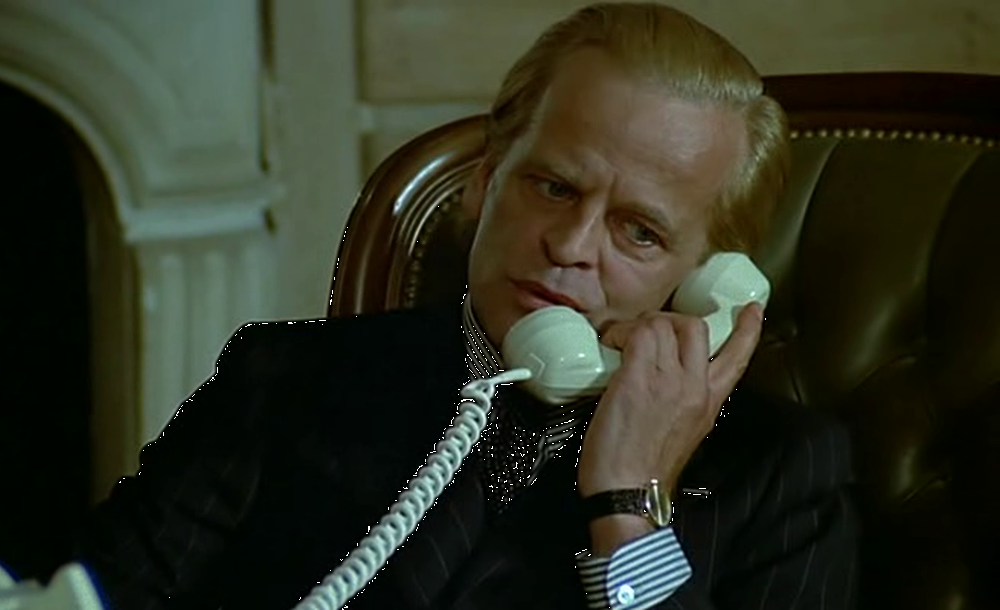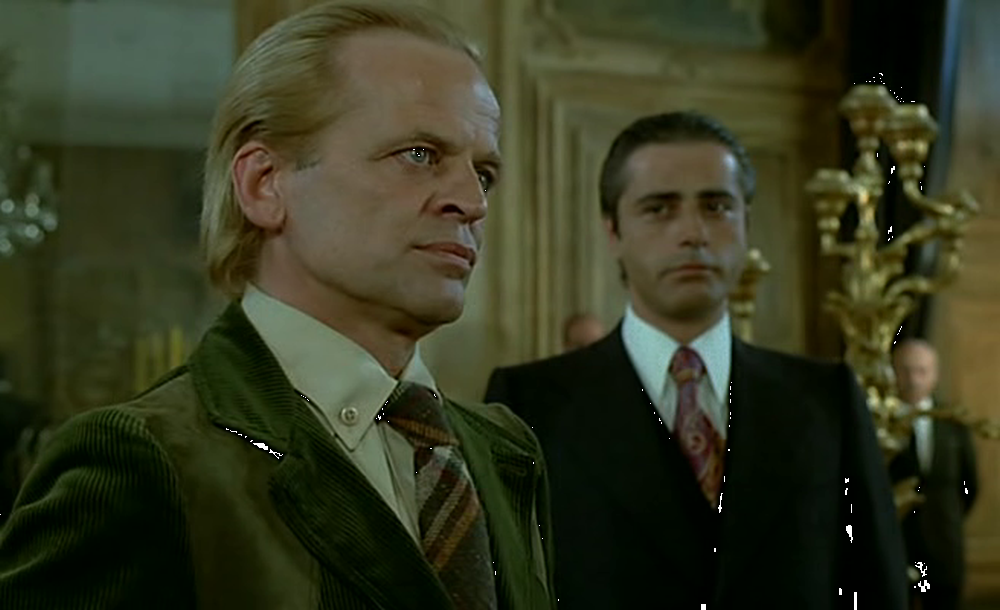Dir: Georges Lautner
Star: Alain Delon, Ornella Muti, Jean Bouise, Klaus Kinski
a.k.a. Death of a Corrupt Man
This political thriller is impressively undated, and with few adaptations, could easily be taking place in the contemporary world. It begins with the murder of Serrano, a fixer with a lot of high-level connections. The man responsible is a member of the French parliament, Philippe Dubaye, who goes to his friend, Xavier Maréchal (Delon) for help. Turns out, Dubaye had also taken a ledger from Serrano, which implicates names all the way to the top in the government and beyond, as having taken bribes. Dubaye has stashed the ledger in the apartment where he keeps his young mistress, Valérie (Muti). But when Dubaye also turns up dead, it’s up to Maréchal and Valérie to navigate the treacherous shoals. For there are a lot of people who would like to get their hands on that ledger, by any means necessary.
Delon may be the epitome of cool, completely unfazed by anything and anyone. He barely raises a sardonic eyebrow when woken in the middle of the night by a friend confessing to murder [interestingly, what we see unfold of this in flashback, and what Dubaye describes, are clearly not the same thing at all]. He retains this phlegmatic temperament through several enthusiastic attempts to kill him. It helps that he’s entirely capable of handling these attempts, having skills better suited to a French F1 driver. But even so, his remarkable grace under the pressure is impressive. I guess when you look as good as Delon, massive slabs of self-confidence comes with the territory!
It’s all wonderfully murky, with the motives and intentions of just about everyone suspect, save for Xavier. He is solely interested in finding out who killed his friend, and that information determines to whom he will give the ledger. This is proof positive of his moral imperatives, for he could quite easily turn the evidence into a large amount of wealth and/or power. That said, it’s equally testimony to his cynical realization, that what happens to the information in it won’t necessarily make a lot of difference. Some politicians will take the fall for the bribes they’ve been given. They’ll just be replaced by others, quite likely with their hands equally out-stretched. Getting justice for Dubaye is about all for which Xavier can hope.
The other thing of particular note, is that this conspiratorial snake is one without a head. Initially, it seems the man at the top may be Monsieur Tomski, the small but important role played by Kinski. He shows up early, with a smile which is more creepy and disturbing than anything, apparently permanently on his face as he moves through the upper echelons of society. Tomski than vanishes from much of the middle. He only re-enters the fray after Xavier is arrested by the cops as a suspect in the murders, easily pulling the strings needed to get our hero released by Commissioner Perne (Bouise). Tomski then invites Xavier to a hunting party at his country mansion, in an effort to apply pressure towards giving up the ledger.

Though Maréchal is lucky to get there alive, since on the road, a pincer movement leads to three vehicles being dumped onto his, off the back of a car transporter. Was this Tomski’s work? Hard to say. Certainly, the industrialist makes it clear he’s not fooling around, with another participant on the hunt being shot, purely to drive home that very point to Xavier. Message delivered, they have a little chat, in which Tomski outlines the film’s worldview in the following terms, yet also indicates that there are other, unseen hands pulling his strings.
“Although you will not find my name on any piece of paper, the ledger you possess is my property. Or, if you want, I am responsible for it to certain people. Since the political climate now is very unfavorable, your exposure can only harm the interests of the country… As long as power has not been captured by the Internationale of workers, it entirely belongs to the Internationale of bankers. And it has its own laws, the new ones. Words like “enemies” or “allies” have lost their significance. There are no friends, only partners. Capital does not recognize any borders.”
Tomski exits the film shortly after. It’s not clear if he ever gets his hands on the ledger. Xavier doesn’t give it to him directly, yet it feels possible the eventual recipient could be working under Tomski. It doesn’t matter, certainly not to Maréchal – though he does remove any reference to his late friend from the dossier before handing it over. And he realizes Tomski was correct: nothing will change. “Some of the people’s representatives will stay on their toes, but not for long. I assure you, time will pass and they will have new masks of honest politicians – like old women, who tighten the skin on their faces… Sleep soundly, Parisians. All is well.”
A couple of other points of note. Muti is a total seventies fox, even if her role in this is rather minor, beyond finding a photographer’s studio where they can copy the ledger. [One of the few aspects which would need updating for a contemporary remake, now we all have cameras on our phones] Though I was amused, again, by Xavier’s low-key reaction on learning that his pal had a secret apartment with a dolly bird stashed in it. I am Xavier’s Complete Lack of Surprise. I also must praise the rich soundtrack by Philippe Sarde, a couple of years before being Oscar-nominated for his score accompanying Klaus’s daughter in Tess. Here, it features sax by Stan Getz. Though sadly, we don’t get Girl From Ipanema worked into proceedings at any point.
While I’d be hard-pushed to call this a major Kinski work, it’s one which I certainly enjoyed watching. Political films often suffer a high degree of attrition over time, as the social and cultural landscape changes. That isn’t the case here, with the nicely cynical attitudes contained just as relevant in 2020.

